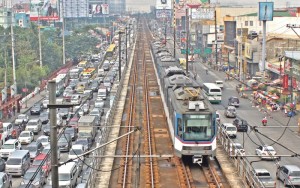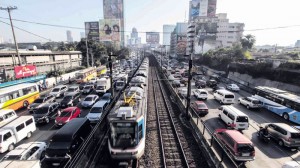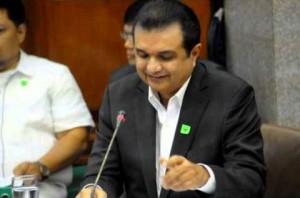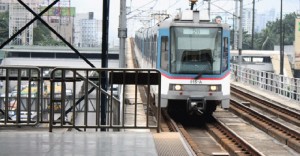By Lorenz S. Marasigan | November 28, 2014
The private owner of the Metro Rail Transit (MRT) Line 3 has urged lawmakers to move for the revision of the current maintenance setup of the train system to immediately address its persisting woes.
MRT Holdings Inc. (MRTH) Chairman Robert John L. Sobrepeña, in a statement submitted to Congress on Tuesday, also urged lawmakers to seek the reinstatement of the former maintenance provider of the train line—Sumitomo Corp.
He explained before the Congressional committees on Metro Manila Development and Transportation that “it is imperative for the safety of the riding public to have a maintenance provider with a single point of responsibility, which Sumitomo had provided, and which has been lost under the present maintenance provider APT Global.”
The current scheme mandates the Department of Transportation and Communications (DOTC) to procure the needed spare parts for the upkeep of MRT, he said.
“During the October 1 Senate hearing, the DOTC maintained that its maintenance contract with APT-Global required APT-Global to supply spare parts for the MRT 3 system, while APT-Global claims that it is not part of its maintenance contract. What is clear then is that no one has been buying spare parts for the MRT 3 system. This fact is shown by the recent revelation that there are no rails, and the DOTC had to use rails from LRT 2,” Sobrepeña said.
The businessman compared this to the performance of Sumitomo, which had honored its responsibility to purchase spare parts as obligated by the contract. Under a single point of responsibility, there would be no finger- pointing, he emphasized.
“It is our belief that it would be to the best interest of the MRT 3 system and the riding public that the single point of responsibility be reinstated by adding the rehabilitation and upgrading of the system to the contract of the maintenance contractor under a long term contract,” Sobrepeña said.
He also proposed for the inclusion of rehab works for the train system in the auction for the P2.2-billion, three-year maintenance contract for the MRT.
“As an immediate solution to the problems plaguing the MRT 3 system, MRTH proposed that the single point of responsibility principle be reinstated, allowing MRTC [MRT Corp.] to undertake under one single contract the maintenance, rehabilitation and upgrading of the MRT 3 system under the management of the former maintenance provider—Sumitomo Corp.,” Sobrepeña said.
The maintenance provider’s work, he said, should be preventive, not corrective. The businessman called on the government to take into account the audit results of the overall review conducted by MTR Hong Kong last quarter.
The auditors noted that there has been a lack of preventive measures, such as failure to replace broken and deteriorated rail tracks, among other items.
“The maintenance, under a Sumitomo contract, will not just include corrective measures but also preventive maintenance and asset-management plan, as recommended by the MTR Hong Kong in its preliminary audit report,” Sobrepeña emphasized.
The rehabilitation to be undertaken by Sumitomo, as part of the proposed new all-encompassing maintenance contract will include the immediate procurement of spare parts, replacement of broken and deteriorated rail tracks, and other works necessary to rehabilitate the MRT line. This will also include the upgrading of the train system for the eventual operations of the 48 train cars that had been procured by the DOTC, which they expected to be delivered in 2015.
Lorenz S. Marasigan





